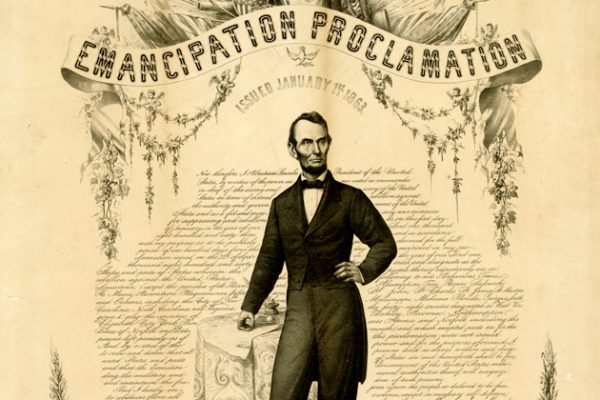As something of a history buff, I wanted to know how Abraham Lincoln freed the slaves with the Emancipation Proclamation. As it turns out, it makes more sense to look at how it led to the Thirteenth Amendment.
Abraham Lincoln was elected on November 6, 1860. Let’s say that the Civil War began about six months later on April 12, 1861, with the Battle of Fort Sumter. Wikipedia does. Jefferson Davis was elected as the President of the Confederate States of America on November 6, 1861. Lots of things happened during that time. I’m not going to get into them. I just wanted to set up a time frame.
On September 22, 1862, Lincoln issued the Emancipation Proclamation, which would go into effect on January 1, 1863.
“That on the first day of January, in the year of our Lord one thousand eight hundred and sixty-three, all persons held as slaves within any State or designated part of a State, the people whereof shall then be in rebellion against the United States, shall be then, thenceforward, and forever free; and the Executive Government of the United States, including the military and naval authority thereof, will recognize and maintain the freedom of such persons, and will do no act or acts to repress such persons, or any of them, in any efforts they may make for their actual freedom….
“Now, therefore I, Abraham Lincoln, President of the United States, by virtue of the power in me vested as Commander-in-Chief, of the Army and Navy of the United States in time of actual armed rebellion against the authority and government of the United States, and as a fit and necessary war measure for suppressing said rebellion, do… order and designate as the States and parts of States wherein the people thereof respectively, are this day in rebellion against the United States, the following, to wit:
“Arkansas, Texas, Louisiana, (except the Parishes of St. Bernard, Plaquemines, Jefferson, St. John, St. Charles, St. James Ascension, Assumption, Terrebonne, Lafourche, St. Mary, St. Martin, and Orleans, including the City of New Orleans) Mississippi, Alabama, Florida, Georgia, South Carolina, North Carolina, and Virginia, (except the forty-eight counties designated as West Virginia, and also the counties of Berkley, Accomac, Northampton, Elizabeth City, York, Princess Ann, and Norfolk, including the cities of Norfolk and Portsmouth[)], and which excepted parts, are for the present, left precisely as if this proclamation were not issued.
“And by virtue of the power, and for the purpose aforesaid, I do order and declare that all persons held as slaves within said designated States, and parts of States, are, and henceforward shall be free; and that the Executive government of the United States, including the military and naval authorities thereof, will recognize and maintain the freedom of said persons.”
Long story short, it named the names of those the Union would fight over slavery.
On April 8, 1864, Congress passed the Thirteenth Amendment (Amendment XIII).
Section 1 of the amendment states:
“Neither slavery nor involuntary servitude, except as a punishment for crime whereof the party shall have been duly convicted, shall exist within the United States, or any place subject to their jurisdiction.”
The House passed it on January 31, 1865.
1865 continued to be a monumental year. General Robert E. Lee surrendered on April 9, effectively ending the Civil War. John Wilkes Booth shot Lincoln less than a week later on Good Friday, April 14. The president passed the next morning at 7:22 am on April 15. Vice President Andrew Johnson was sworn in that day. He declared the war over on May 9. Busy month! On December 6, the Thirteenth Amendment was ratified and on December 18, Secretary of State William H. Seward proclaimed its adoption.
To put it in context, the Civil War started on April 12, 1861, and was over officially on May 9, 1865. The Emancipation Proclamation was issued on September 22, 1862, and the 13th Amendment became official on December 18, 1865.
However, there is that line about slavery “as a punishment for crime whereof the party shall have been duly convicted.” I recommend viewing 13th on Netflix to see the impact of the 13th Amendment on African-Americans and our prison system. There is still freedom to be won.


There are no voices yet... Post-script us a message below, won't you?